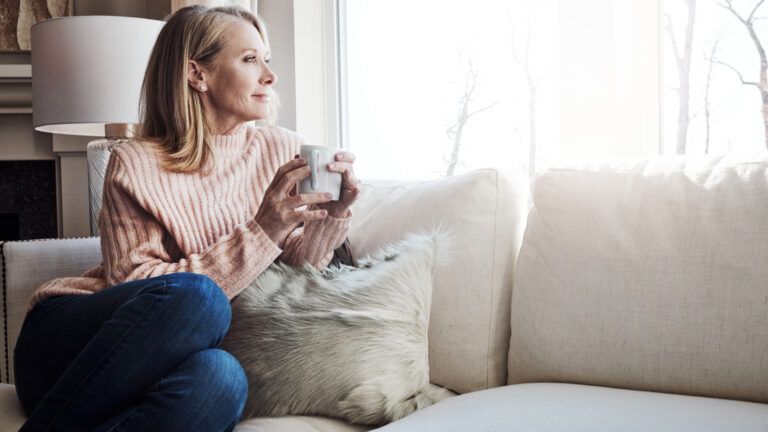“I should have … I shouldn’t have … It’s all my fault … I’m no good …” The caregiver guilt pit. It’s an easy place to wind up, but you don’t have to get stuck there.
Given the often overwhelming responsibilities of caring for a loved one with a challenging condition, spiraling into self-blame is a common scenario. Yet caregivers have way more power over what they do with feelings of guilt than they may think, according to a geropsychologist who helps families get trustworthy and helpful information about common dementia struggles. Natali Edmonds, CEO of Dementia Careblazers, told Guideposts.org that feeling guilt can be an important opportunity for reflection and positive change. The important thing is to reframe your thinking in order to move out of the guilt trap.
“Most caregivers are going to be caregivers for years,” Edmonds said. “So you probably don’t want to be struggling with guilt for years. You might experience it from time to time but it can be a great place to get great at feeling uncomfortable feelings. Emotions are a powerful indicator of what’s going on in our minds, and as long as you think that the outside world dictates how you feel, you won’t have any control over anything. But we have a lot of control over a lot of things, and I think gaining more awareness of the the thoughts inside of our minds that are leading to some of these feelings can be helpful.”
Edmonds offered the following tips to help family caregivers avoid getting mired in feelings of guilt:
Remember that guilt stems from your thinking about a situation, not the situation itself. “Guilt is a feeling and feelings come from our thoughts. No action, no situation in life actually leads to guilt. It is your thinking about the situation that leads to guilt. Let’s say you have a family member who needs to go into a care facility. It’s not putting your loved one into a care facility that leads to guilt. It’s that you are thinking that you should have done something differently. Another person could be thinking something different, like, ‘I’m glad they’re going to be able to have 24/7 supervision and get the care that they need.’ You could have 10 caregivers in the same exact situation and they would all feel differently because it has nothing to do with the situation. It has everything to do with their thinking about the situation. You can think about a situation in ways that disempower you, that bring you down and that lead to guilt, or you can think about a situation in a ways that are going to empower you, make you feel confident and help you feel reassured that you’re making the right decision. Both are equally optional, both are equally available, but most people go to the option of guilt because that is easier for our brains. Our brains have a negativity bias, as we call it in psychology. So you have to do some work and put some effort into realizing that. When your brain offers you that stuff, how do you want to purposefully think about it instead?”
Don’t view your caregiving in terms of how your loved one is progressing. “A lot of people talk about guilt but not a lot of people talk about why are we feeling guilty and what can we do about it. There’s a lot of attention on the problem but very little attention on the solution. You might be caring for a family member who has an illness that is going to get worse, no matter how amazing your care. Sometimes caregivers wrap up how they’re doing based on how their loved one is doing. That’s not fair because you could be doing the most amazing things in the world and the disease will just progress, no matter what. So you have to make sure you’ve separated what you’re doing from how your loved one is progressing.”
Treat yourself as you would someone you care about. “If you were to have a loved one or great friend come to you and say, ‘Hey, I feel so guilty. I’m struggling with this situation, this is happening and I just have all this guilt,’ what would you say to that person? It’s probably not going to be, ‘Well, you should feel guilty. That’s horrible. I can’t believe you did that!’ You would never say that to somebody you care about. You would be so supportive, you would be so kind, you would be so compassionate. You would let them know, ‘You’re trying your best, this is a hard situation, I’m really sorry you’re going through this.’ Tell yourself the same exact things you would say to somebody you care about. We hold ourselves to things that you would never ever put on another person. The other thing is to realize that we don’t have to beat ourselves up when we feel guilt. It brings on a whole other level of suffering when it’s like, ‘Oh, I’m feeling guilty again and I’m upset that I’m feeling guilty again.’ There is a lot to be said for just allowing ourselves to feel how we’re feeling without beating ourselves up for feeling how we’re feeling. Beating yourself up is never going to help you feel better. So if all you do is just allow yourself to be a human and feel all the emotions, you would be so far ahead of so many people and relieve a lot of suffering.”
Don’t internalize your loved one’s behavior. “The hardest part about dementia caregiving is that you sacrifice so much time, so much energy, so much love—you do everything—and the person with dementia may not be able to understand or acknowledge it at all. In fact, they may do the complete opposite, saying things like, ‘You’re holding me back, you’re treating me like a child, you’re trying to interfere with my life.’ This is where having an understanding about the disease can really be helpful, so that you don’t internalize, ‘Wow I am doing awfully, I am horrible.’ Instead, realize this is what the dementia process is doing to your loved one’s brain, that this is how they are interpreting their reality.”
Allow yourself joy by focusing on the moment. “Withholding sources of joy or pleasure from yourself does not somehow give the person you’re caring for a better quality of life. Let’s say you give yourself a chance to enjoy some sort of activity that your loved one can’t enjoy with you. It’s going to be natural for your mind to wander and think about that person and feel bad that they can’t be there and can’t enjoy it. That’s okay. But when your mind goes there, realize that you can rob yourself of your opportunity for joy and pleasure that you’re in right now by feeling guilty that you’re doing something without your loved one, and that this in no way improves their situation. So when that wave of guilt comes over you, you can acknowledge that you are missing the person and then, using your five senses and a practice of mindfulness, come back into the moment. Focus on what you’re hearing, what you’re seeing, what you’re feeling—on the environment around you. So long as you’re somewhere doing something without the person you’re caring for, you might as well be doing it because no amount of feeling guilty and anxious and thinking about whatever is happening with that other person is going to have any impact on that other person.”
For more on ways to overcome common caregiver challenges, Edmonds posts weekly videos at: https://www.youtube.com/dementiacareblazers.






